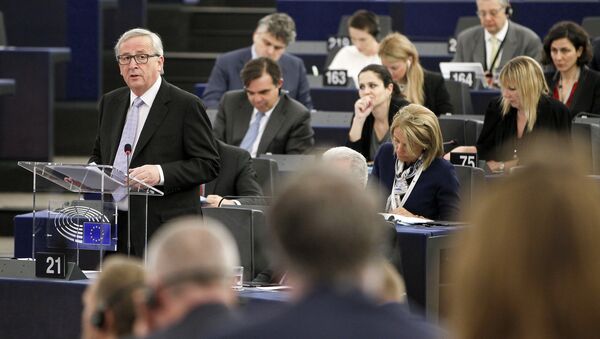Just weeks ahead of the crucial In-Out referendum in Britain on the UK membership of the EU, Juncker conceded:
"I think that one of the reasons that European citizens are stepping away from the European project is that we are interfering in too many domains of their private lives. And too many domains where the member states are better placed to take action and pass legislation."
The migrant crisis — and the EU's failure to reach agreement on how to deal with it — has led to countries closing their borders and a rise in anti-immigration sentiment throughout Europe. The Schengen borderless zone is in tatters and the EU-Turkey deal to stop the flows through the West Balkan Route has divided Europe.
'Risk of Implosion'
"I made it clear back in 2006 that the European project was running out of steam, there was disappointment. I don't think the situation has fundamentally changed, on the contrary," Juncker said.
"Yes, it's right we are not very popular when we plead the case for Europe. You are no longer respected in your country if you insist that in the necessity of supra-national bodies.
"We were wrong in overregulating and interfering too much in the daily lives of our fellow citizens… But we would also be wrong if we insufficiently respected the principle of solidarity," Juncker told the parliamentary assembly of the Council of Europe — which is not an institution of the EU.
Don't be afraid of #refugees: they bring their talent, energy & knowledge. Full speech: https://t.co/OPYFSkhaWq pic.twitter.com/eIROCQRg69
— European Commission (@EU_Commission) April 19, 2016
His comments echo those of European Parliament President Martin Schulz, who told with the Frankfurter Allgemeine Zeitung newspaper that many people have lost trust in "entire institutions, whether national or European".
"Europe has been on a sliding slope for some time now. Many people's trust in institutions, whether national or European, has gone. Hardly any of the governments is fighting to reach the hearts of the people," Schulz said, blaming heads of states and administrations for the loss of confidence.
There is a high risk of an "implosion of the EU. If the British leave the EU, there will be [other] demands for further escape referendums," Schultz said.
A poll by the University of Edinburgh in March found that, in France, a majority of people would like a referendum on EU membership (53 percent) and in Sweden, Germany, and Spain there are more respondents in favor of holding a similar referendum than opposed.
Another poll by de Hond in the Netherlands found that 53 percent of Dutch wanting an EU membership referendum similar to the British vote. At this stage, 44 percent would vote to stay in the EU and 43 percent would vote to leave voting to leave.




